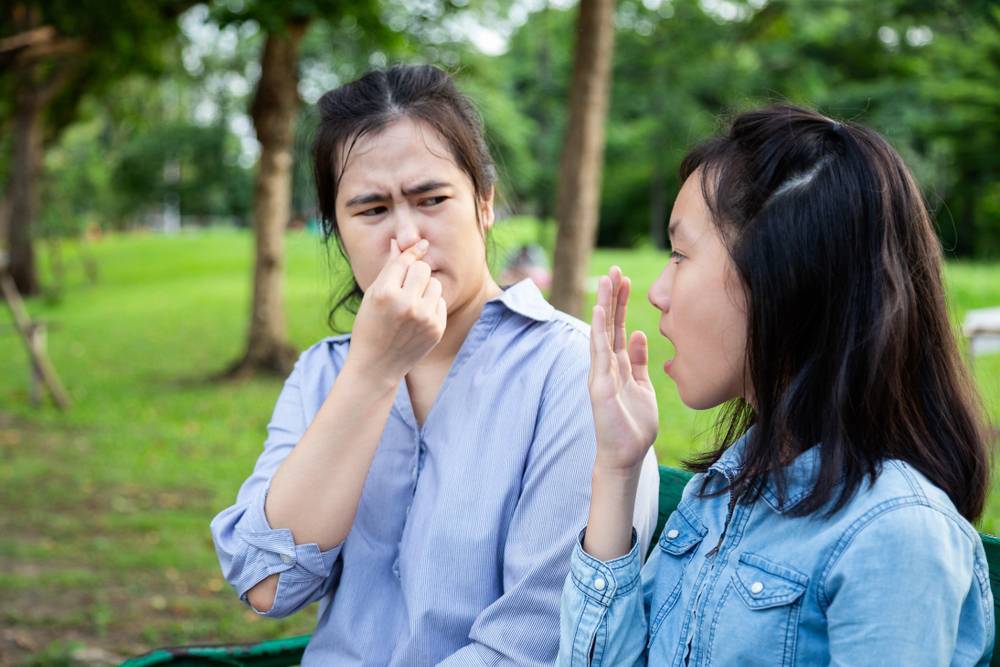Experiencing bad breath is common in the morning or after consuming an aromatic meal or drink, but sometimes it can be pathologic and chronic.
It can be embarrassing if the individual is not aware of their bad breath and they find out about it from a family member, relative, friend or co-worker. Read on to find out some tips on how to avoid bad breath.
Common Causes of Bad Breath and Appropriate Remedies
While bad breath may be common, it is preventable! Below are some of the common causes and corresponding remedies for bad breath:
- Physiologic bad breath – otherwise known as morning breath, can be prevented by immediately scraping your tongue using a toothbrush or a tongue scraper upon waking up. This should be an important step in your morning oral care routine as food particles from the previous day may accumulate at the back of the tongue.
- Food trapped in between teeth – flossing helps to remove food stuck in between teeth. It is also important to have routine cleaning (at least yearly) by a dentist or a dental hygienist.
- Tooth decay or caries – is usually remedied by getting a restorative tooth filling by a dentist.
- Dry mouth – increased water intake and decreased consumption of sugary liquids such as soft drinks, fruit juices, and oral irritants such as coffee, alcohol, and nicotine. Certain medications such as antihistamines, diuretics, and amphetamines may also cause dry mouth.
Chronic Bad Breath and Other Serious Factors
While some cases can be addressed easily, there are instances that warrant a visit to a specialist. Sometimes, bad breath may be an indicative symptom of an underlying condition or disease. If the underlying condition is left untreated, the efforts to prevent bad breath will only be short-term. Some examples of such underlying conditions include:
- Periodontitis or severe gum infection
- Gastroesophageal reflux disease (GERD)
- Acute or chronic sinusitis
- Acute or chronic tonsillitis
- Pulmonary infections such as bronchitis
- Systemic diseases such as advanced renal disease, advanced liver disease, or diabetic ketoacidosis
Subjective Bad Breath
In some instances, pseudo-halitosis or bad breath without any objective confirmation may occur. This may be psychological or neurological in nature. Experiencing psychological bad breath may be common amongst individuals whose bad breath has already been managed.
Certain conditions may also prompt an individual to be overly conscious about oral hygiene. Halitophobia is defined as the persistent and irrational fear of having bad breath.
Disorders associated with the sense of taste or smell may also cause an individual to suspect having bad breath despite the lack of objective confirmation.
Oral Care in the Elderly
Maintaining good oral hygiene and avoiding bad breath are not limited to any age group. In fact, it becomes more crucial in elderly or terminally ill patients as they may oftentimes be neglected. Good oral health habits can be incorporated into daily oral care routines in some of the following ways:
- Using a soft-bristled or an electric toothbrush
- Fluoride toothpaste
- Alcohol-free mouthwash
- Removing and cleaning dentures with a denture brush
- Soaking dentures in a solution if candidiasis is present
General Management
For the general population, here are some of the universal rules to follow in order to avoid bad breath:
- Increasing saliva flow by chewing sugar-free gum
- Frequently drinking water to stay hydrated
- Avoiding alcohol
- Limiting coffee
- Regular oral care including the use of floss and rinsing with mouthwash
- Scraping the back of the tongue, especially in the morning

